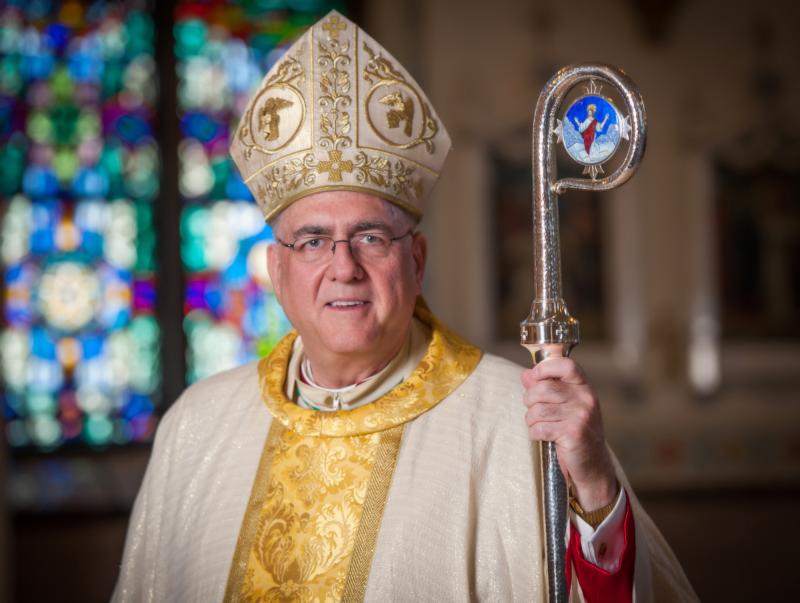
by Archbishop Joseph F. Naumann
Do you think Mike Matheny is the right choice to manage the Royals?
I have had that question posed to me several times since the Royals announced Ned Yost’s successor.
For some Royals’ fans, Matheny has two strikes against him: 1) He was fired from his previous managerial post; and 2) Even worse, he managed the St. Louis Cardinals.
While it is true that the Cardinals let Matheny go midseason in 2018 when the team appeared destined to miss the playoffs for the third consecutive year, nevertheless, Matheny’s overall record with St. Louis was impressive.
Under Matheny’s leadership, the Cardinals made the playoffs his first four seasons, winning the division championship three times and the National League pennant once. In his 6½ years as manager, his teams won 591 games while losing 474.
During Matheny’s tenure, the Cardinals averaged winning 90 games per season, hitting a high water mark in 2015 with 100 victories.
When the Cardinals hired Matheny, it was also controversial. While he was a well-respected major league catcher, his only managerial experience was being a successful Little League manager. Matheny’s playing career was cut short as a consequence of a severe concussion injury.
When he was approached by some parents to coach a Little League team in St. Louis, he asked to meet with all the players’ parents to inform them of his expectations if he assumed this role.
Matheny had a code of conduct for his players that included: 1) never showing any displeasure with an umpire’s call; 2) a good attendance record for practices as well as games; and 3) a good work ethic evidenced by effort displayed in practices and games.
Matheny also had expectations for the parents as well. He would not entertain any complaints from parents about their son’s playing time or position assignments.
He expected parents to model good conduct for the boys by showing respect for umpires and coaches. He also made clear to parents that the goal of the team was not to entertain them, but to help their sons develop baseball skills and knowledge, and, even more importantly, to cultivate virtues. Matheny devoted one-third of every practice to teaching virtues to his young players.
Managing major league athletes and Little Leaguers is quite different. Being successful in teaching young boys baseball skills and virtue does not necessarily translate into being a successful major league manager.
However, I believe personal integrity and principled leadership result in long-term success in any field of endeavor.
The success Matheny enjoyed in St. Louis bodes well for the Royals. Actually, I anticipate Matheny will be an even more successful manager in Kansas City because of what he learned from his successes and, more importantly, his mistakes in St. Louis.
Leo Durocher is reputed to have said: “Nice guys finish last!” I never agreed with that philosophy. Instead, I believe principled leadership breeds success. Dayton Moore and Mike Matheny are both men with a deep Christian faith that guides their leadership styles.
With the commitment and enthusiasm of the new ownership, with Dayton Moore’s track record of effective leadership in building a winning culture and championship team, and with Matheny’s leadership on the field, the future looks bright for the Royals.
Spring training is just around the corner. I am hoping in the not too distant future for another I-70 World Series!


With all due respect, the Matheny column left me scratching my head. A lot.
Not sure I get why the local leader of the church felt compelled to write a column discussing the hiring of a baseball manager, including selective siting of some stats and anecdotes supporting the decision. I guess it’s because Matheny claims to be “deeply religious”. Or, maybe the Arch Bishop was suggesting we should be “forgiving” of Matheny’s past “mistakes”.
My confusion, my position is the piece was clearly unbalanced, incomplete and glaringly omitted an apparent primary reason he was fired-that being enabling a toxic, demeaning culture within his clubhouse. I sure hope he fosters a Yost, supporting an nurturing clubhouse for all the young players and that he indeed has learned from his mistakes. The true mark of effective leadership is found in the perceptions of his followers. And in this particular instance, time will tell whether he indeed has learned from his “mistakes” in that regard.